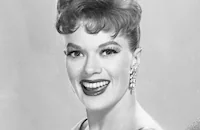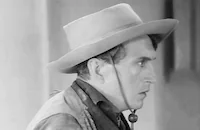Welcome to Hard Times didn't fit into either of these categories although it did LOOK like a Western from the old school. Originally produced for television but released theatrically, it featured Henry Fonda in the lead role and the supporting cast was a virtual who's who of the Western genre - Warren Oates, John Anderson, Royal Dano, Edgar Buchanan, Denver Pyle, Paul Fix, Elisha Cook Jr., Keenan Wynn, and Aldo Ray as the meanest pyromaniac in the West. But the mood of the film was another matter entirely. Here is a Western where the hero is a spineless wimp and it's not played for laughs. Audiences didn't want to see Henry Fonda playing a coward and they stayed away in droves. But if you approach the film as an allegory - Think High Plains Drifter (1973) with Clint Eastwood and you've got the idea - you'll find an intriguing tale about how difficult it is for people to take a moral stand on anything, even when it threatens their whole way of life.
Welcome to Hard Times, based on a novel by E. L. Doctorow, the author of Ragtime, was one of several non-traditional Westerns that Henry Fonda made during the mid-sixties, the others being The Rounders (1965), A Big Hand For the Little Lady (1966), and Once Upon a Time in the West (1969). The title of the film was apt because Henry Fonda was also going through some rough times offscreen with his son Peter. In his autobiography,
That wasn't the case with daughter Jane who was just about to bare all in Barbarella. But's that's another story.
When Welcome to Hard Times opened theatrically, it received decidedly mixed reviews. Bosley Crowther of the New York Times wrote, "It's different, all right. It's listless, haphazard, and there isn't a single person in it with whom you're made to identify. Not even Mr. Fonda, who walks through it drearily." Richard Schickel of Life magazine was more objective, stating that the film "may be a bit hard to take for those who insist on purity in the Western form. Certainly the violence of the film, though infrequent, is far too savage for exposure to childish or squeamish eyes, even though one can truthfully say that it is esthetically justified...It may be imperfect, but it is well worth the attention of anyone who cares about such matters."
Henry Fonda, however, was his own worst critic, later admitting, "[Director-scripter Burt Kennedy] and I went into it with a great deal of enthusiasm, meaning we committed outselves to the project based on the strength of our mutual enthusiasm for the book...It didn't work as a picture, but I wasn't surprised because by the time we got to the production I knew it wouldn't."
Producer: David Karr, Hank Moonjean, Max E. Youngstein
Director: Burt Kennedy
Screenplay: Burt Kennedy, E.L. Doctorow (novel)
Cinematography: Harry Stradling Jr.
Film Editing: Aaron Stell
Art Direction: Carl Anderson, George W. Davis
Music: Harry Sukman
Cast: Henry Fonda (Mayor Will Blue), Janice Rule (Molly Riordan), Keenan Wynn (Zar), Janis Paige (Adah), John Anderson (Ezra/Isaac Maple), Warren Oates (Deputy Marshal Leo Jenks).
C-103m. Letterboxed.
by Jeff Stafford






























